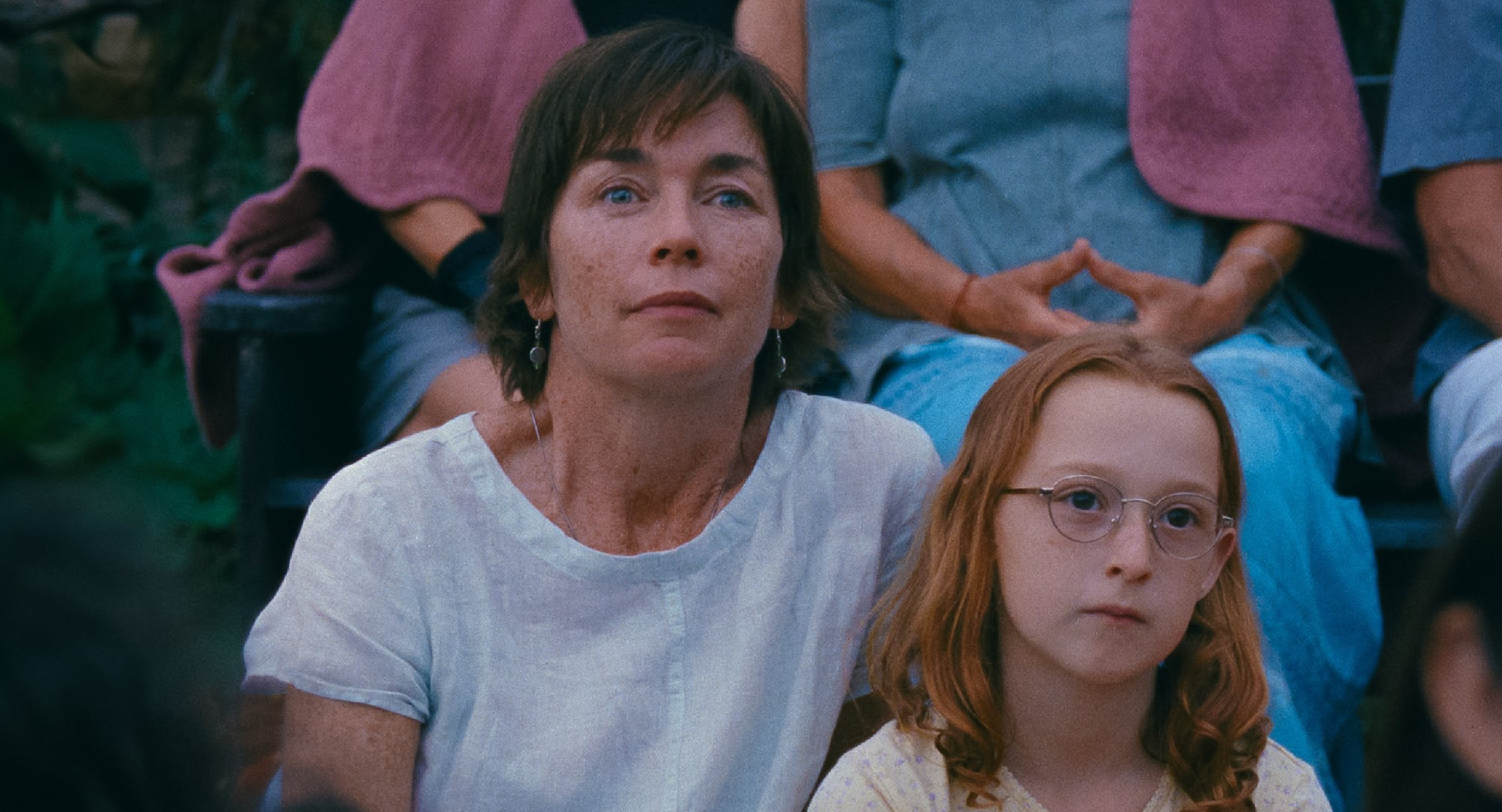In her feature directorial debut, Annie Baker dives into the nuanced and sometimes tumultuous waters of a mother-daughter relationship in the coming-of-age drama Janet Planet. Starring Julianne Nicholson, Zoe Ziegler, Elias Koteas, Will Patton, and Sophie Okonedo, the film sets itself in the summer of 1991, capturing the atmospheric essence of rural western Massachusetts with a painterly attention to detail.
Janet Planet centers around Janet (Julianne Nicholson), a free-spirited acupuncturist who adheres to the hippie lifestyle, and her 11-year-old daughter, Lacy (Zoe Ziegler). The plot unfolds over a languid summer, during which Janet invites three significant individuals into their lives: her boyfriend Wayne (Will Patton), her friend Regina (Sophie Okonedo), and local theater group leader Avi (Elias Koteas). These new presences become sources of tension for Lacy, who is skeptical of their influence on her mother and wary of her changing family dynamic.
Janet, on the other hand, finds herself increasingly frustrated with Lacy’s clinginess, yearning for personal freedom and adult companionship. This central conflict forms the emotional core of the film, exploring the inevitable push-and-pull between maternal duty and personal desire.
The Good:
Julianne Nicholson delivers a layered performance as Janet, balancing the character’s free-spirited nature with moments of vulnerability and frustration. Nicholson’s portrayal captures the complex duality of a woman who loves her daughter deeply but also yearns for a life beyond motherhood. Her interactions with the various characters invited into her home are nuanced, showing different facets of Janet’s personality and desires.
Zoe Ziegler, in her role as Lacy, is a revelation. She brings an earnestness and sensitivity to the character that makes her skepticism and emotional turmoil palpable. Ziegler’s portrayal ensures that Lacy is not merely a petulant child but a young girl struggling to understand her place in a rapidly changing world.
Elias Koteas as Avi, the theatre group leader, adds a layer of artistic and intellectual allure to the film. His character becomes a catalyst for some of the most introspective and revealing moments between Janet and Lacy. Sophie Okonedo’s Regina offers a contrasting perspective as a more grounded and pragmatic figure in Janet’s life. Will Patton’s portrayal of Wayne provides a rugged, yet tender presence.
Annie Baker’s transition from celebrated playwright to filmmaker is marked by a keen eye for visual storytelling. The film’s pacing is deliberately slow, mirroring the languid summer days and giving the audience time to absorb the subtleties of the characters’ interactions and the picturesque setting. Baker’s attention to detail in recreating the early ’90s adds a nostalgic layer to the film.
The cinematography by Maria von Hausswolf is nothing short of poetic. Each frame is carefully composed, making use of natural light to enhance the film’s earthy, organic feel. The rural landscape becomes a character in itself, with rolling hills, dense woods, and sun-dappled fields providing a serene yet sometimes isolating backdrop to the unfolding drama.
Janet Planet delves deep into themes of independence, familial bonds, and the often painful process of growing up. The film subtly explores the generational gap between Janet and Lacy. It highlights how the quest for personal freedom can sometimes clash with parental responsibilities. Janet’s involvement with Wayne, Regina, and Avi symbolizes her desire to break free from the confines of her role as a mother, even as Lacy clings to the stability and safety that Janet represents.
Baker’s script is rich with symbolism, often using the rural setting to reflect the characters’ internal states. The isolation of their home mirrors Lacy’s feeling of being left behind. The wide-open spaces represent Janet’s yearning for freedom.
The Bad:
While Janet Planet is a visually stunning and emotionally resonant film, its slow pacing might not appeal to all viewers. The film’s deliberate tempo allows for deep character exploration. However, it also requires patience and a willingness to engage with the subtleties of the narrative. Some might find the plot meandering and the conflict understated compared to more dramatic coming-of-age stories.
Additionally, the film occasionally borders on being too introspective. There are long stretches of silence and minimal dialogue. This might leave some audience members yearning for more explicit development and resolution.
Overall:
Annie Baker’s Janet Planet is a beautifully crafted, introspective film. It offers a poignant exploration of a mother-daughter relationship against the backdrop of a rural 1990s summer.
Janet Planet Review
-
Acting – 8/10
-
Cinematography/Visual Effects – 8/10
-
Plot/Screenplay – 7/10
-
Setting/Theme – 7.5/10
-
Watchability – 7/10
-
Rewatchability – 5/10
User Review
( votes)
